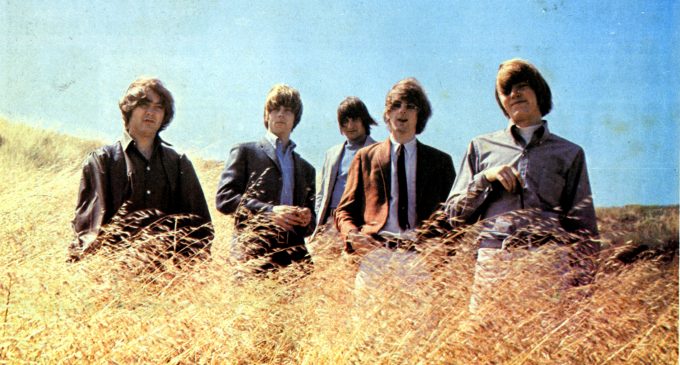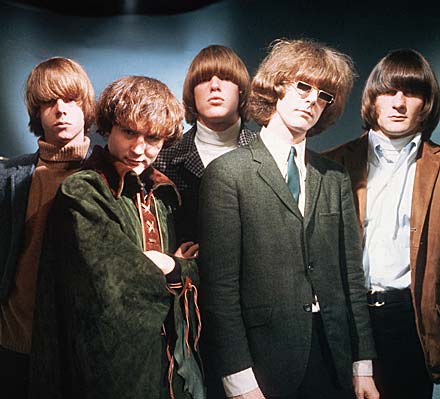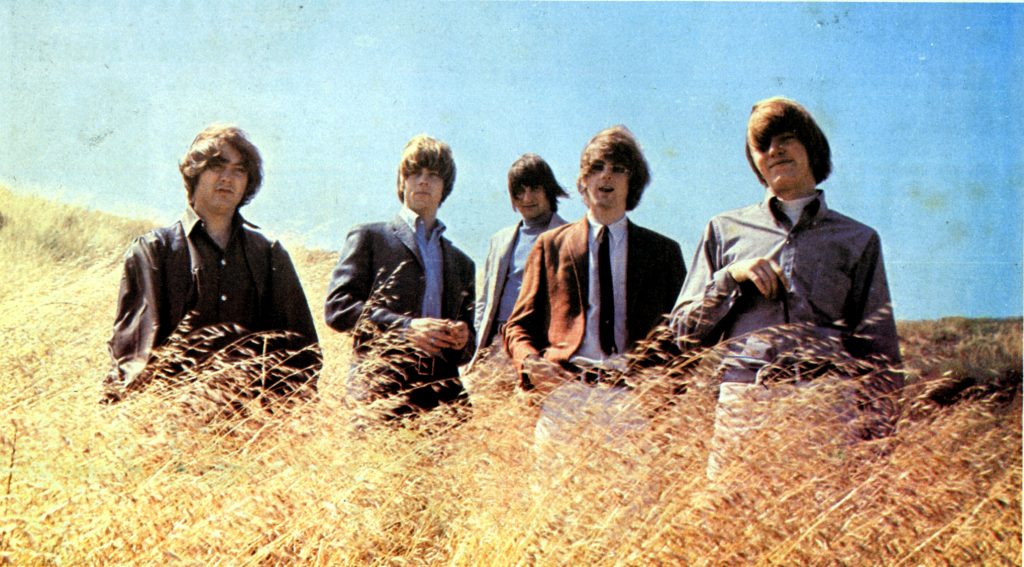Influencing America

Influencing America
by Bill Harry
The Beatles and the British bands inspired American youth resulting in more homegrown groups, rather than solo singers, beginning to emerge on the American music scene.
A prime example is the Byrds, who were once tagged ‘the American Beatles.’
Roger McGuinn had originally been a folk singer, but became inspired when he saw the film ‘A Hard Day’s Night’ in August 1964.
During his performances at the folk club the Troubadour, he began to play Beatles songs in his set. Then, together with Gene Clark, another folk artist he knew who was interested in the Beatles, they formed a duo, similar to Peter & Gordon. They then wanted to form a group and together with David Crosby and Chris Hillman recorded some demos under the name the Jet Set. They knew Mike Clarke and brought him in as a drummer.
McGuinn recalled, “We each heard them, saw them in ‘A Hard Day’s Night’, and I personally went out and got a Rickenbacker 12-string guitar like George had and David got a Gretch and our drummer got Ludwig drums and we just patterned ourselves after the Beatles individually.”
Later in 1964 they made a record for Elektra under the name the Beefeaters, but by the end of the year had changing their name again, this time to the Byrds, once again inspired by the Beatles – spelling birds with a ‘y’ just as beetles was with spelt with an ‘a’
McGuinn says that without the Beatles they would never have existed. He said, “We loved them. We revered them. After we made it, I went to parties with the Beatles and I was in awe at the time, a great feeling.
He was also to say, “The Beatles came out and changed the whole game for me.”

The Byrds met the Beatles socially on several occasions and David Crosby has been credited with bringing Ravi Shankar’s music to the attention of George Harrison.
The Beatles helped to popularise many American artists in the United Kingdom and led to debut tours by artists such as Chuck Berry and Carl Perkins. Their admiration for Motown artists, which resulted in covers of three Motown hits on their debut album ‘Please Pease Me’, also helped to promote the Motown acts – with the Beatles adding Mary Wells to one of their British tours and Brian Epstein booking artists such as the Four Tops to tour Britain. The British blues boom in the 1960s also led to the revival of interest in veteran blues artists and to U.K. tours for artists such as B.B.King and Muddy Waters.
The Beatles also lauded the Beach Boys and the lightweight California type surf numbers began to mature considerably with Brian Wilson finding the Beatles an ideal act to compete against in his creation of classic numbers such as ‘God Only Knows’ and ‘Good Vibrations.’
One of the most obvious Beatles-inspired outfits was the Monkees, a band specially created for a television series by American producers Bob Rafelson and Bert Schneider. Impressed by the Beatles film ‘A Hard Day’s Night’, they formed the Raybeat Company to develop a pilot sit-com for Screen Gems based on the Beatles movie.
Series director Schneider was even to comment, “The Beatles made it all happen, that’s the reality. Richard Lester is where the credit begins for the Monkees and for Bob and me.”
Initially, Rafelson and Schneider considered using an existing group the Lovin’ Spoonful for the series, then they decided that they would prefer actors and took out an advertisement in the entertainment magazine Variety. It read: MADNESS! Auditions – folk and rock ‘n’ roll musicians/singers. Running parts for four insane kids, ages 17 to 21, with courage to work.”
Among the 437 young hopefuls interviewed were Stephen Stills, Paul Williams, Danny Hutton (who became leader of Three Dog Night) and Charles Manson.
One member of the group had been pre-selected. He was David Thomas Jones, more familiarly known as Davy Jones, a Manchester born actor/singer who had appeared in the Broadway version of ‘Oliver’ as the Artful Dodger (and who had appeared as a member of the ‘Oliver’ cast on the Beatles debut appearance on the ‘Ed Sullivan Show’ in February 1964).
The other members were Mike Nesmith, a Texas born guitarist who had moved to Los Angeles where he’d appeared with various bands.
Peter Thorkelson, more familiarly known as Peter Tork, a Washington born keyboardist and bass guitarist and Mickey Dolenz, a Los Angeles born actor who’d appeared as Corky in the TV series ‘Circus Boy.’
The first name considered for the group was the Turtles, then the Inevitables and finally, the Monkees.
A month before the series made its debut on NBC on September 5 1966, a single ‘Last Train to Clarksville’ was released – and it went on to top the American charts.
Although the group had been formed especially for the series, it was decided to include music in all the shows and publisher Don Kirshner, who’d been asked to find songs for the groups initial recordings, gathered songs for a number of songwriters including Neil Diamond, Leiber & Stoller, Neil Sedaka, Gerry Coffin, Carole King and Barry Mann.
In the group’s theme song at the beginning of each episode the group sang ‘no no no’ as a counterpoint to the Beatles ‘yeah yeah yeah.’
There were 58 episodes of the television series, which lasted until March 25, 1968.
Brian Epstein’s NEMS Enterprises also brought them over to England to appear at the Empire Pool, Wembley.
Apart from the TV series, the Monkees had nine albums and fourteen singles released between August 1966 and May 1970.
The surf music craze had begun in the early 1960s with artists such as the Beach Boys, the Surfaris and Jan & Dean, but after the Beatles appeared, the amount of American rock bands who began to appear in the charts increased. They included the Beau Brummels (who choose their name because they thought it would place their records next to those of the Beatles in the record bins), the McCoys, the Byrds, Sam the Sham & the Pharoahs, the Turtles, the Lovin’ Spoonful, Paul Revere & the Raiders, the Outsiders, Cyrkle, the Young Rascals, ? & the Mysterians, the Gentrys, the Ramsey Lewis Trio, the Bobby Fuller Four, Shadows of Knight, Tommy James & the Shondells and many others.
Solo singers continued to have hit records in America, despite the impression that the Beatles had stifled their popularity – the Beatles had simply caused the influx of British and American groups into the charts, adding to the diversity of the listings.
Arguably, the Beach Boys were the American band who were closest to the Beatles in overall creativity, mainly due to the genius of Brian Wilson. While many of the other bands recorded songs provided to them by songwriters, the Beach Boys material, like that of the Beatles, was individual to them.
Later, inspired by the Beatles, many British and American bands began to record their own material and it is the songwriters more than the solo singers, who suffered most from the influence of the group.
The Beatles probably diverted the Beach Boys away from their surf sounds and, in fact, the Beach Boys were No 5 in the American charts with ‘Fun Fun Fun’ when the Beatles made their impact in February 1964. They also topped the charts later that year with ‘I Get Around.’
The American band shared the same label as the Beatles, Capitol Records and were also bedfellows in the record bins due to the first three letters of their name.
In 1965 the Beach Boys appeared in the film ‘The Girls On The Beach’ in which kids at a school hop think they had booked the Beatles, but get the Beach Boys instead!
A fierce competitiveness was generated when the Beatles ‘invaded’ America, particularly in the mind of Brian Wilson. Brian was the creative fire behind the group, which also comprised his brothers Carl and Dennis, his cousin Mike Love and friend Al Jardine.
Brian’s output following the appearance of the Beatles was so stimulated that the group had a huge string of hits and became the biggest selling band on Capitol Records next to the Beatles. Brian turned his concentration increasingly to production and songwriting and ceased touring. After hearing the ‘Rubber Soul’ album in 1965 he was so impressed he decided he‘d try to surpass it stating that he would produce the greatest rock ‘n’ roll album ever made and began to work on ‘Pet Sounds.’ It was well received critically in Britain, but in America it didn’t fare so well, particularly as Capitol rush-released ‘The Best Of the Beach Boys’ compilation several weeks later which was far more successful and turned Gold.
He then began to work on another album which he called ‘Smiley Smile’, intending that work to surpass the Beatles. During the making of the album the Beatles came out with ‘Sgt Pepper’s Lonely Hearts Club Band’, which was such a masterpiece that Brian became disillusioned, scrapped his project and just issued a few of the tracks on an album called ‘Smile.’
However, the Beatles had great admiration for the Beach Boys and became friends of theirs, with Paul McCartney saying at the time that he regarded ‘God Only Knows’ as the best song ever written.
Written by: Bill Harry ©2017. All rights reserved. No unauthorised copying or re-publishing of this material is allowed by law. Please contact the writer for re-print permission.
(Contributor, McCartney Times)




There are no comments at the moment, do you want to add one?
Write a comment